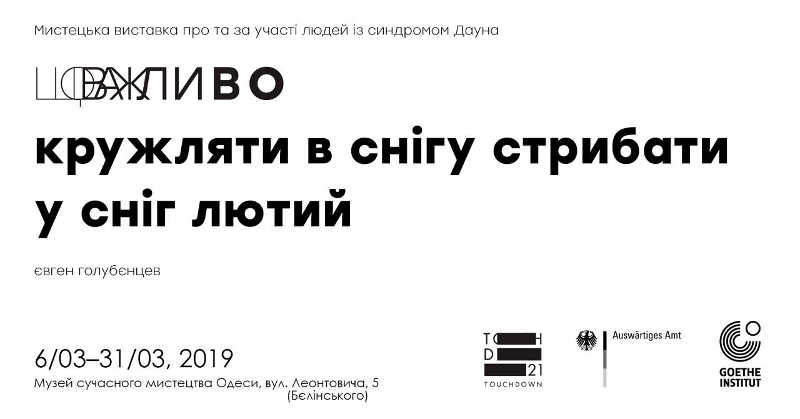“What matters”. An exhibition for people with/without Down syndrome?
27.02.2019 2023-11-19 20:04“What matters”. An exhibition for people with/without Down syndrome?

Love, sex, death or politics? “What is important for people with/without Down syndrome? An art exhibition about and with the participation of people with Down syndrome will be held in Odesa, at the Museum of Contemporary Art (5 Leontovycha Street) from 6 to 31 March. The exhibition is a part of the project of inclusion in culture initiated by the Goethe-Institut in Ukraine in partnership with the TOUCHDOWN 21 research project with the financial support of the Federal Foreign Office of the Federal Republic of Germany.
The project curators Lizaveta Herman and Maria Lanko selected more than 40 works created by contemporary Ukrainian and German artists over the past 20 years. People with Down syndrome co-authored some of the works: paintings and videos.
As part of the project, the artists Stanislav Turina and Kateryna Libkind, with the help of their partners from Germany from the TOUCHDOWN 21 project, spent several months interacting with people with Down syndrome to find out what worries them the most. The artists whose works are presented at the exhibition reflect on these topics.
“The Museum of Odesa Modern Art has long supported the idea of inclusion. For several years now, the MoOMA has been cooperating with the Sunny Children Foundation in Odesa. We gladly agreed to the proposal of the Goethe-Institut to hold the What Matters project in the museum, because it is important for us to be a space for dialogue and interaction,” comments Semen Kantor, director of the Museum of Odesa Modern Art.
Visitors will also meet art objects from Germany: works by artists with Down syndrome and a series of photographic portraits by Brit Schilling.
Odesa residents will see a video work – an actor’s reading based on a script written by Ukrainian actor with Down syndrome Oleksandr Steshenko.
“Oleksandr Steshenko’s scripts are reminiscent of popular TV series about love and human relationships. Popular series that are watched by thousands of viewers on television and on the Internet. Director Pavlo Yurov, set designer Kateryna Libkind, videographers Yarema Malashchuk and Roman Khimey and guest actors staged the play based on Oleksandr Steshenko’s script. The audience’s attention is focused on the text of the script. On the plot, the characters’ dialogues and the peculiarities of the language. The language used by the author of the script,” explains Lizaveta Herman, art critic and co-curator of the exhibition.
The exhibition will feature works by contemporary Ukrainian artists, such as Andriy Sahaidakivsky, who creates paintings on canvas and rugs. They will also see bright works by Myroslav Yagoda and Alevtina Kakhidze, for whom art is a means of coming to terms with the problems and inconveniences in her own life.
“The Goethe-Institut in Ukraine, together with its German partner TOUCHDOWN 21, is exploring the creative work of people with Down syndrome, building bridges between these extraordinary artists, social activists and the young artistic community in Ukraine. “It is extremely important for us to develop the discussion on inclusion in the cultural sphere,” says Katarina Görig, Cultural and Educational Programme Officer at the Goethe-Institut in Ukraine, “This is the first time such different partners have been united in one project. I can tell you that it is not easy, but that is what made the project so successful in Kyiv last autumn.”
During the exhibition, visitors will also enjoy a series of cultural events: a unique stage performance TOUCHDOWN 21 mini, which answers many questions about Down syndrome, curatorial tours of the exhibition, and the performance “Tasty or Not Tasty” by Stanislav Turina.
At the same time, on 13 and 21 March at 19.00, the Impact Hub Odesa (1a Hretska St.) will host film screenings of films that affect the lives of people with an extra chromosome. In particular, a screening of the film “Adults”, winner of many film festivals about the love and struggle of people with Down syndrome, by Chilean director Maite Alberdi. Odesa residents will also see Familiye by Kublay Sarikascha and Sedat Kirtan, a black-and-white gangster film from Berlin, where a boy with Down syndrome is part of a gang.
INFORMATION ABOUT THE EXHIBITION AND CONTACTS:
Organisers: Goethe-Institut in Ukraine together with its German partner TOUCHDOWN 21 with the financial support of the Federal Foreign Office of the Federal Republic of Germany. Other partners are the All-Ukrainian Charitable Organisation “Down Syndrome”, the All-Ukrainian Charitable Organisation “Sunny Children”, the Museum of Contemporary Art of Odesa, and Impact Hub Odesa.
Entrance to the exhibition and all events is free.
Announcements and schedule will be available on the page: https://www.facebook.com/events/352971055549463/
